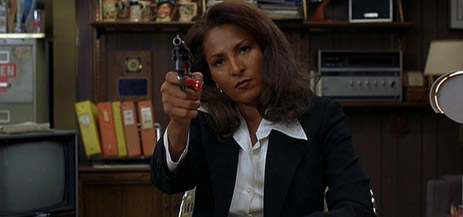Viking Night: Jackie Brown
By Bruce Hall
November 12, 2013
BoxOfficeProphets.com

So looking back, as a big fan of Tarantino’s first two films, I should have trusted him more when he adopted a different direction with his third. At the time, I didn’t give Jackie Brown enough credit. Now, I consider it the most complete and down to earth film Tarantino has ever made.
Now comes the obligatory section where I point out that Jackie Brown is based on Elmore Leonard’s Rum Punch, a book that I’m pretty sure at least one of us has not read. On paper, Leonard and Tarantino would seem to be a solid creative fit, and on film it’s hard to argue with the results. Artistically, it’s not easy to put your own stamp on someone else’s material without it feeling derivative but here, the finished product elevates the original work and creatively brings the filmmaker into his own at a point in his career that would ultimately benefit us all. I don’t know about you, but I’d rather have two Kill Bills, a Basterd and a Django than Pulp Fiction four more times.
The star of Jackie Brown is the character of the same name (played by Pam Grier), a 40-something African-American flight attendant whose career is quietly winding down with Backwater Airlines. Maybe she relied too long on her looks; maybe she made some bad choices – but she still carries herself with a lot of pride. So much in fact, that she doesn’t notice two ATF agents following her until they corner her in a parking garage. Agent Nicolette (Michael Keaton) discovers a large stash of cash and a heaping helping of nose candy in Jackie’s purse. Turns out that to keep the bills paid, she occasionally smuggles things across the border for a weapons smuggler named Ordell Robbie (Samuel L Jackson), and the Feds are wise to it. They give Jackie a chance to roll over on her boss but she refuses, and is thrown in jail.
Ordell, meanwhile, is well aware of who gave him up to Uncle Sam. He arranges bond for Beaumont (Chris Tucker), both a childhood friend and the loose lipped flunky in question. Beaumont turns up mysteriously shot to death in the trunk of a car, right before Ordell returns to skeptical bail bondsman Max Cherry (Robert Forster), looking to now bail Jackie out of prison. Cherry agrees, but finds himself suspicious of Ordell’s rather obvious motives - especially when he sees how beautiful his new client is. Jackie is aware of Max’s attraction AND that Ordell sees her as a threat – so with Max’s help, she cooks up an elaborate plan to clear her name with the Feds, clear Ordell’s bank accounts, and then bug out of the country, free and clear.
At a fundamental level, Jackie Brown is a fairly run of the mill heist movie full of interesting but not particularly memorable characters. Robert DeNiro and Bridget Fonda show up as a pair of stoner meatheads who haunt Ordell’s crib, but they serve little purpose outside occasional comic relief (when DeNiro gets his Lifetime Achievement Award, there will be no clips from this movie in the video montage). No, the real story here is the relationship between Jackie and everyone else. Ordell wants her dead, or to at least help him with an urgent financial matter and THEN to be dead. Nicolette wants Jackie to help him collar Ordell – boosting his own career in the process. And Cherry wants to help Jackie either because he naturally wears a white hat, or because he thinks he has a chance to get inside her. Either way, the story strongly suggests that the reason Jackie is where she is in life is because she’s allowed herself be used by others, and now is her one big chance to turn it around forever.
Grier is up to the task. She’s not a commanding screen presence, but she fills the bill. I can’t blame Tarantino for casting his idols; if they ever let me make a movie I will immediately cast Bruce Campbell and Kurt Russell as wisecracking buddy cops who play by their own rules - so I have no room to judge. The real get here is Forster, whose coiled intensity and noble comportment give Cherry the kind of pathos you can’t write into a script. Samuel L. Jackson is as Samuel L. Jackson does, but as always he makes good use of his time on screen. As for Tarantino, he largely (and wisely) restrains himself, gently setting his story in motion and letting the momentum – and the music - do most of his work.
My only complaint – if you can call it that – is that there’s a very soft payoff to Jackie Brown. It’s a good ending, and it’s also a narratively consistent one. I guess there’s a part of me that wanted to see things go a different way, and that’s probably a testament to how “into” the characters I really was. I really wanted to know whether Jackie was capable of taking back her life, and what role these very different men would play in it. Perhaps the best thing you can say about any story is that no matter what happens at the end, the fact that you still care - that it actually means something to you – makes the whole thing a success.
If that’s the case – and I say it is – then Quentin Tarantino didn’t really peak 16 years ago, he just finally grew up.